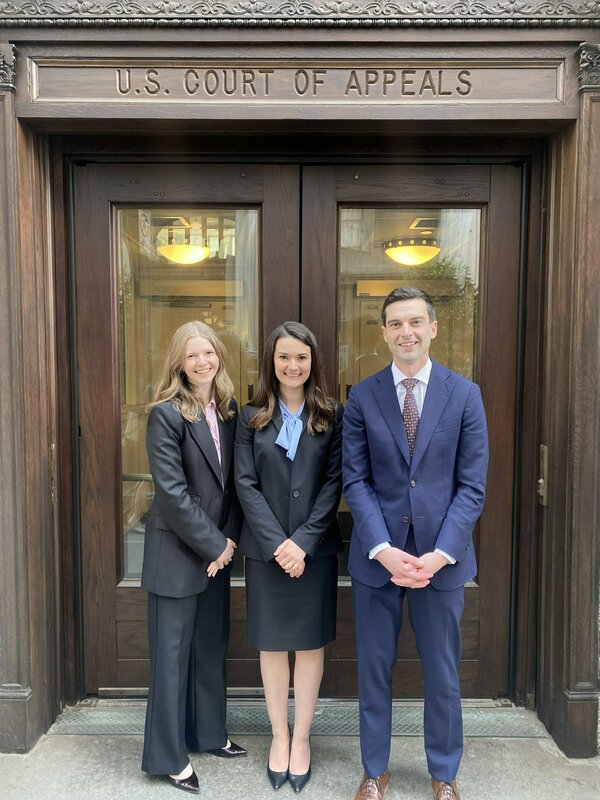Notre Dame Religious Liberty Clinic Represents Volunteer Minister Barred from County Jail Because of His Religious Views

Today, the Eleventh Circuit Court of Appeals heard argument in Jarrard v. Sheriff of Polk County, a federal appeal challenging a trial court’s decision that permits county officials to discriminate against a volunteer minister simply because of his religious beliefs.
The Notre Dame Law School Religious Liberty Clinic represents Stephen Jarrard, a Church of Christ minister who shares his beliefs with inmates in jails and prisons across Georgia. Since 2016, Jarrard has been excluded from a volunteer jail ministry program in Polk County, Georgia, solely because the Sheriff of Polk County personally disagrees with Jarrard’s beliefs about salvation.
“I am so deeply appreciative of the legal team. They are my heroes. I feel like David before Goliath,” said Jarrard.
For nearly two decades, Jarrard has served as a volunteer minister at jail and prison facilities in Georgia. Through his ministry, Jarrard shares God’s word and the Gospel with prisoners by engaging them in discussions about the Bible. As a member of the Church of Christ, Jarrard believes that baptism is necessary for salvation and must be performed by full immersion — a belief that Jarrard shares with inmates who seek his ministry.
The Polk County Sheriff’s Office invites members of the community to volunteer to share their personal religious beliefs with interested inmates at the County Jail. The program, ostensibly, is open to community members of all faiths.
But, since 2016, County Sheriff Johnny Moats and former Chief Jailer Al Sharp, have banned Jarrard from the Jail’s ministry program because they personally reject his views on baptism. In 2019, Moats told Jarrard in writing that his views were not welcome in the volunteer ministry program because they contradict Moats’ own interpretation of the Bible and contradict the Jail’s official “stance” that baptism is not necessary for salvation. At various times, the Jail also banned all religious rituals, including baptisms, through frequently changing policies.
Jarrard v. Sheriff of Polk County
Click on the link above to read the case documents that Notre Dame Law School’s Religious Liberty Clinic filed in the U.S. Court of Appeals for the Eleventh Circuit and the U.S. District Court for the Northern District of Georgia.
In January 2020, Jarrard sued the County officials, challenging his discriminatory exclusion from the ministry program under the First Amendment. The trial court recognized that there is substantial evidence that the County officials acted out of personal hostility to Jarrard’s religious beliefs about baptism. But it nonetheless dismissed Jarrard’s claim, holding that Jarrard’s religious expression was not entitled to any First Amendment protection because his ministry was essentially the County’s own speech to control.
Jarrard has appealed that decision. As the Clinic has made clear throughout the appeal, the First Amendment plainly prohibits government officials like Moats and Sharp from denying benefits, opportunities, or access to government facilities to a person merely because he has expressed religious views which the officials dislike. John Meiser, director of Notre Dame’s Religious Liberty Clinic, argued the appeal before the Eleventh Circuit.
“If the First Amendment stands for anything, it is that government officials may not enforce their own personal orthodoxy in matters like religion,” said Meiser. “The Sheriff may not punish Stephen and deny him the opportunity to minister to inmates simply because the Sheriff reads the Bible differently.”
“There would be no doubt that excluding volunteers because they were Muslim, Jewish, Sikh, or any other faith would be unconstitutional discrimination,” said Meredith Holland Kessler, staff attorney of Notre Dame’s Religious Liberty Clinic. “Jail officials’ exclusion of Stephen because they view him as the wrong kind of Christian is no different.”
The Notre Dame Law School Religious Liberty Clinic has worked alongside attorneys Zack Greenamyre of Mitchell Shapiro Greenamyre & Funt, LLP and Gerald Weber of Atlanta. Students from the Religious Liberty Clinic have been involved in every step of the appeal, from researching and drafting briefs to helping prepare for oral argument.
“It was thrilling to watch the judges engage with the arguments we’ve been immersed in for these past months. Sitting in class, what we’re learning can feel very abstract and theoretical, far removed from its practical effects,” said second-year law student Alicia Armstrong, a student fellow in the Religious Liberty Clinic. “It’s exciting to be working towards an outcome that will allow Mr. Jarrard to return to his ministry.”
This case has drawn support from First Amendment scholars and leading religious liberty organizations. Michael McConnell (Stanford Law School), Eugene Volokh (UCLA School of Law), and Richard Garnett (Notre Dame Law School) filed an amicus brief in support of Jarrard’s appeal. The Jewish Coalition for Religious Liberty and the Religious Freedom Institute also filed an amicus brief.
Read more about the range of cases that the Clinic has taken up on our website.
About the Notre Dame Law School Religious Liberty Clinic
The Notre Dame Law School Religious Liberty Clinic represents individuals and organizations from all faith traditions to promote not only the freedom for people to hold religious beliefs but also their fundamental right to express those beliefs and to live according to them. Students in the clinic work under the guidance of Notre Dame Law School faculty and staff to provide advice, counsel, and advocacy on a broad array of matters related to religious freedom in the United States and abroad. The Religious Liberty Clinic has participated in proceedings at all levels of federal and state courts, in administrative agencies, and before foreign courts and other governmental bodies around the world.
Learn more about the Religious Liberty Clinic at religiousliberty.nd.edu/clinic/.
Originally published by at religiousliberty.nd.edu on April 19, 2024.